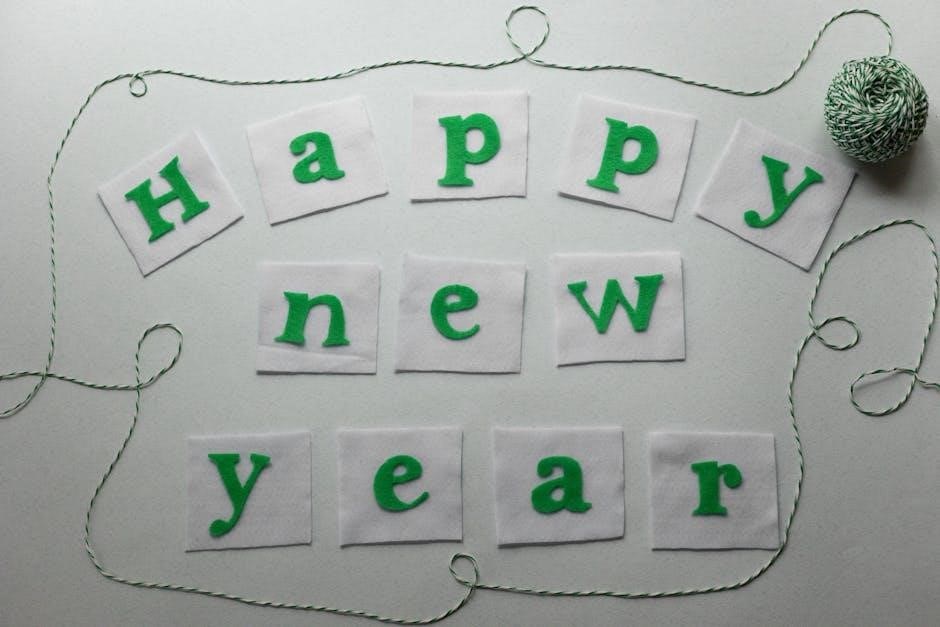end of the year report card comments for kindergarten pdf
Summary
Discover adorable and meaningful end-of-year report card comments for kindergarten. Perfect for teachers! Download PDF templates now.

End-of-year report cards for kindergarten provide a comprehensive summary of a child’s progress‚ highlighting growth‚ skills‚ and milestones achieved during the academic year.
Importance of Report Cards in Kindergarten
Report cards are vital for tracking a child’s progress‚ celebrating strengths‚ and identifying areas for growth. They provide clear communication between teachers and parents‚ offering insights into academic‚ social‚ and emotional development. These documents help set expectations and guide future learning‚ ensuring a strong foundation for upcoming educational milestones.
Purpose of End-of-Year Report Cards
End-of-year report cards aim to summarize a student’s progress‚ highlighting achievements and growth across the academic year. They provide a clear overview of skills mastered‚ areas for improvement‚ and social-emotional development. These documents serve as a communication tool for parents‚ offering insights to support their child’s continued learning and personal development.
Key Elements of Effective Report Card Comments
Effective report card comments are clear‚ concise‚ and constructive‚ providing specific feedback on student progress‚ strengths‚ and areas for growth while maintaining positivity and encouragement.
Structure and Clarity in Comments
Clear structure and concise language ensure comments are easy to understand. Start with the student’s name‚ use specific examples‚ and organize feedback logically. Avoid vague statements‚ focusing on observable behaviors and progress. This approach helps parents and students grasp achievements and areas for improvement effectively‚ making the feedback actionable and meaningful.
Positivity and Encouragement
Positive comments foster a supportive environment‚ celebrating students’ strengths and accomplishments. Encouraging language motivates children to continue striving‚ while acknowledging efforts reinforces perseverance. Highlighting progress builds confidence and provides a foundation for future growth‚ ensuring students feel valued and inspired to succeed.
Specificity and Actionable Feedback
Specific comments provide clear insights into a student’s performance‚ enabling targeted growth. Actionable feedback offers practical steps for improvement‚ helping students and parents understand how to address areas needing development. Detailed examples and suggestions guide future efforts‚ ensuring feedback is constructive and meaningful for continued progress.
Tips for Writing Constructive Comments
Tips for writing constructive comments include being clear‚ specific‚ and positive‚ ensuring feedback is actionable and tailored to individual student progress and needs.
Focus on Individual Student Progress
Focus on individual student progress by acknowledging achievements and growth throughout the year. Celebrate specific milestones‚ like improved reading skills or better social interactions. Address challenges constructively‚ offering actionable feedback. Tailor comments to reflect each child’s unique journey‚ ensuring parents and students understand their development and areas for future focus.
Highlighting Strengths and Areas for Growth
Highlighting strengths and areas for growth provides a balanced perspective on a student’s development. Recognize their accomplishments‚ such as strong social skills or creativity. Gently identify areas needing improvement‚ like fine motor skills or sharing‚ with specific examples. This approach encourages a positive outlook while guiding future efforts and parental support.
Using Clear and Concise Language
Using clear and concise language ensures report card comments are easily understood by parents and students. Avoid jargon or overly complex phrases‚ focusing on straightforward statements. This approach helps parents grasp their child’s progress and areas for improvement without confusion‚ making the feedback practical and actionable for future development.
Common Challenges in Writing Comments
Teachers often face challenges like avoiding vagueness‚ ensuring objectivity‚ and balancing positivity with constructive criticism when crafting end-of-year report card comments for kindergarten students effectively.
Avoiding Vagueness
Avoiding vagueness in report card comments ensures clarity and specificity‚ providing meaningful feedback. Instead of general statements like “does well‚” specify achievements‚ such as “consistently demonstrates strong problem-solving skills” or “shows significant improvement in reading fluency.” Clear examples help parents and educators understand a child’s progress and areas for growth effectively. This approach fosters actionable outcomes and supports continued development.
Ensuring Objectivity
Ensuring objectivity in report card comments involves basing feedback on observable behaviors and measurable progress. Focus on specific actions‚ like “participates actively in group discussions” or “demonstrates improved fine motor skills‚” rather than subjective opinions. This approach maintains fairness and transparency‚ providing parents with a clear understanding of their child’s development and achievements throughout the year.
Balancing Positivity with Constructive Criticism
Balancing positivity with constructive criticism ensures that report card comments are both encouraging and informative. Highlight strengths and achievements‚ while gently addressing areas for growth. For example‚ “Emma consistently shows creativity in art projects. Encourage her to use more descriptive language in writing to enhance her storytelling skills.” This fosters a supportive and growth-oriented environment for young learners.

Subject-Specific Comments
Subject-specific comments provide detailed insights into a child’s progress in areas like language arts‚ mathematics‚ social studies‚ and science‚ helping track their development and understanding of key concepts.
Comments for Language Arts
Comments for language arts focus on reading‚ writing‚ and communication skills. Examples include: “Shows improved reading comprehension‚” “Demonstrates creativity in writing‚” and “Speaks clearly and confidently in class discussions.”
Comments for Mathematics
Mathematics comments highlight progress in number sense‚ problem-solving‚ and basic skills. Examples include: “Shows strong understanding of shapes and counting‚” “Demonstrates ability to compare numbers‚” and “Approaches math problems with curiosity and enthusiasm.”
Comments for Social Studies and Science
Social studies and science comments focus on curiosity‚ participation‚ and understanding. Examples include: “Engages actively in discussions about communities‚” “Shows interest in exploring the environment‚” and “Demonstrates awareness of basic science concepts through observations and questions.”
Social-Emotional Development in Report Cards
Social-emotional development is crucial in kindergarten‚ focusing on skills like sharing‚ cooperation‚ and self-awareness. Report cards highlight growth in social interactions‚ emotional regulation‚ and classroom responsibility.
Assessing Social Skills
Social skills assessment in kindergarten focuses on cooperation‚ empathy‚ and responsibility. Children are observed in group activities‚ noting their ability to share‚ take turns‚ and resolve conflicts. Progress is documented in report cards‚ highlighting growth in interpersonal interactions and suggesting areas for further development. Positive behaviors and improvements are always acknowledged.
Evaluating Emotional Intelligence
Evaluating emotional intelligence in kindergarten involves assessing self-awareness‚ self-regulation‚ and empathy. Teachers observe how children express emotions‚ manage feelings‚ and show understanding toward others. Positive reinforcement is provided for strengths‚ while areas for growth are noted gently‚ fostering emotional development and social harmony in the classroom environment.

Cultural Sensitivity in Report Card Comments
Cultural sensitivity in report card comments involves respecting diverse backgrounds‚ using inclusive language‚ and valuing each child’s unique experiences and progress.
Respecting Diverse Backgrounds
Respecting diverse backgrounds in report card comments involves understanding and valuing each child’s cultural‚ linguistic‚ and family experiences. Teachers should acknowledge individual differences and ensure comments are inclusive‚ reflecting each student’s unique identity and contributions‚ fostering a sense of belonging and appreciation for diversity in the classroom environment.
Using Inclusive Language
Using inclusive language in report card comments ensures respect for all students‚ regardless of gender‚ culture‚ or background. Avoid gendered terms and use neutral phrases like “the student” or “they.” This approach fosters a welcoming environment and ensures every child feels valued and respected in their individual growth and achievements.

Using Templates and Examples
Templates and examples for end-of-year report card comments provide teachers with structured guidance‚ ensuring clarity and consistency. They offer pre-drafted phrases and frameworks to save time while maintaining professionalism and readability‚ making the commenting process efficient and effective for kindergarten educators.
Benefits of Using Templates
Using templates for end-of-year report card comments streamlines the process‚ saving time and ensuring consistency. They provide a structured framework‚ reducing drafting time while maintaining clarity and professionalism. Templates also offer a starting point for customization‚ allowing teachers to focus on individual student progress and strengths. This ensures each comment is clear‚ concise‚ and meaningful.
Examples of Effective Comments
Effective comments highlight progress and strengths‚ such as‚ “Speaks clearly in front of the class and shows improved reading skills.” Another example: “Demonstrates a strong work ethic and takes pride in their work.” These examples provide clear‚ actionable feedback while celebrating individual growth and achievements throughout the year. They are concise‚ specific‚ and meaningful.

Digital Tools for Report Card Creation
Digital tools simplify report card creation‚ offering templates‚ PDF formats‚ and design software to streamline the process for kindergarten teachers and ensure professional-looking results efficiently.
Software for Designing Report Cards
Specialized software like Adobe InDesign and Google Docs offers customizable templates and design tools‚ enabling teachers to create professional-looking report cards. These programs allow for easy formatting‚ font adjustments‚ and the inclusion of comments‚ making the report card creation process efficient and visually appealing for kindergarten students.
PDF Tools for Distribution
PDF tools like Adobe Acrobat and Smallpdf enable teachers to create‚ edit‚ and share report cards efficiently. These tools offer features such as converting documents to PDF‚ adding comments‚ and securing files with passwords. They also support bulk sharing via email or online platforms‚ ensuring report cards reach parents promptly and securely.
Best Practices for Sharing Report Cards with Parents
Timely sharing of report cards keeps parents informed about their child’s progress. Clear and positive language ensures effective communication. Including examples or next steps guides parents in supporting their child’s development.
Effective Communication Strategies
Effective communication involves sharing report cards with clarity and positivity. Use clear language‚ highlight strengths‚ and provide actionable feedback. Include examples of achievements and next steps for growth. Ensure the tone is supportive and encouraging‚ fostering a collaborative relationship with parents to support their child’s development.
Preparing for Parent-Teacher Conferences
Review the report card and organize key points to discuss. Highlight progress‚ strengths‚ and areas for growth with specific examples. Prepare questions to engage parents and encourage collaboration. Focus on positive‚ solutions-oriented dialogue to support the child’s continued development and success.
End-of-year report cards are a meaningful way to celebrate a child’s growth and achievements‚ providing insights into their social-emotional development and academic progress.
Key Takeaways
- End-of-year report cards for kindergarten are essential for summarizing a child’s progress and achievements.
- Comments should be clear‚ specific‚ and focused on individual growth and development.
- Highlighting strengths and areas for improvement provides constructive feedback for parents and students.
- Using positive and encouraging language fosters a supportive learning environment.
- Report cards serve as a valuable tool for guiding future academic and social-emotional development.
Final Advice for Teachers
Teachers should focus on crafting clear‚ specific‚ and positive comments that highlight individual progress and growth. Use actionable feedback to guide future development‚ and maintain a supportive tone. Ensure comments are objective and tailored to each student’s unique journey. Leveraging templates and digital tools can streamline the process while maintaining personalization and clarity.